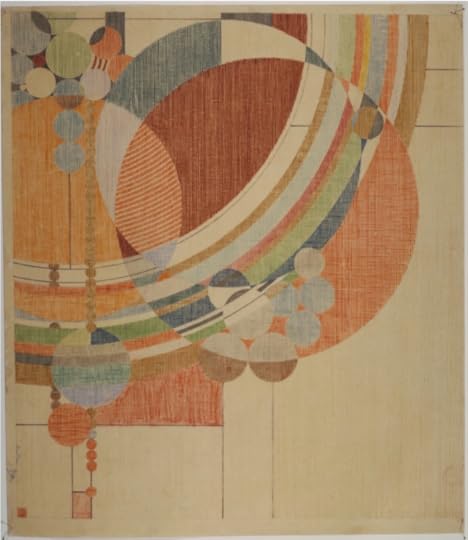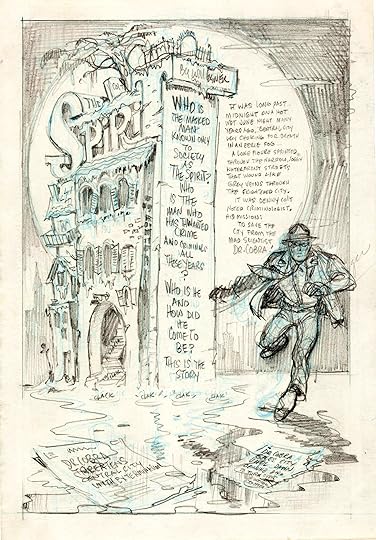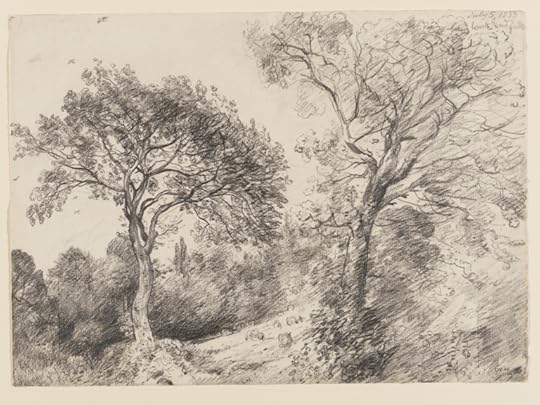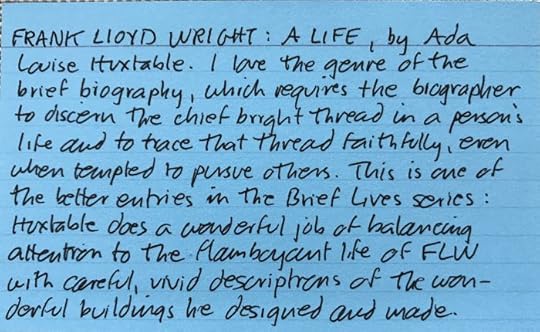Alan Jacobs's Blog, page 262
February 11, 2018
making life simpler
A great many intellectual positions are obvious and incontestable to people who are ignorant of and incurious about history. That’s why they go to such great lengths to maintain that ignorance.
between vanity and avarice
In studying your own pages I find that the great majority of the names which are quoted as those of important young writers are wholly unfamiliar to me. That will demonstrate how ignorant I am of recent literary movements. I don’t think this is a particularly unhealthy condition for an elderly writer. There are flibbertigibbets who in middle-age attend international cultural congresses and busy themselves with the latest fashions. Few of those are notable for their literary production. A writer should have found his métier before he is 50. After that he reads only for pleasure; not for curiosity about what others are doing. Please do not interpret this as scorn or jealousy of the young. It is simply that they are tastes and achievements are irrelevant to his work.
[The middle-aged writer] can contribute either to popular papers or to those of small circulation. In the first case he will find his work mutilated by sub-editors and scrawled over with inappropriate titles, but he will be paid 20 times as much as by a more humane employer. The choice is between vanity and avarice.
— Evelyn Waugh, letter to David Wright, 21 April 1960
February 10, 2018
the gifts of the Owner of the World
To some of us the Owner of the World has apportioned the gift to tell their fellows that the time to get up has finally come. To others He gives the eagerness to rise when they hear the call; to rise with racing blood and put on their garbs of war and go to the boundary of their town to engage the invading enemy boldly in battle. And then there are those others whose part is to wait and when the struggle is ended, to take over and recount its story.
The sounding of the battle-drum is important; the fierce waging of the war itself is important; and the telling of the story afterwards—each is important in its own way. I tell you there is not one of them we could do without. But if you ask me which of them takes the eagle-feather I will say boldly: the story. Do you hear me? . . .
So why do I say the story is chief among his fellow? The same reason I think that our people sometimes will give the name Nkolika to their daughters — Recalling-is-Greatest. Why? Because it is only the story that can continue beyond the war and the warrior. It is the story that outlives the sound of war-drums and the exploits of brave fighters. It is the story, not the others, that saves our progeny from blundering like blind beggars into the spikes of the cactus-fence. The story is our escort; without it, we are blind. Does the blind man own his escort? No, neither do we the story; rather it is the story that owns us and directs us. It is the thing that makes us different from cattle; it is the mark on the face that sets one people apart from their neighbours.
—an old man, in China Achebe’s Anthills of the Savannah [1987]
February 9, 2018
Will Eisner: The Spirit
Constable: Trees on Hampstead Heath
The Black Prince of Burgess and Roberts
So: Anthony Burgess, back when he was alive, thought that a movie should be made about Edward the Black Prince and that he should write the screenplay. (Whether he is equally interested in the project now that he is dead I cannot say.) He drafted said screenplay, but nothing ever came of it. But, thought Adam Roberts, if the story cannot be a movie might it not become a novel? So he wrote said novel. (More details here.)
I have now read the novel, and it is remarkable: the imagination of Burgess combined with the imagination of Roberts and inspired technically by the method of John dos Passos in his U.S.A. Trilogy) — with a soupçon of Eliot’s “The Waste Land.” Literary collage: highly imagistic scenes rendered by Camera Eye, March-of-Time-style newsreels, brief character portraits, chunks of sermons. The story of a soldier called Black George is especially powerfully rendered. Roberts captures with precise and sometimes disturbing fidelity that interlacing of deep piety and sheer brutality that we discern when we look closely at the world of Medieval Latin Christendom.
The publication of the book, through Unbound, still needs to be fully funded. You can, and should, support the project by going here and paying the merest pittance. If you do, then I shall pray God to have mercy on your soul. If not….
choice
You can’t understand the place and time you’re in by immersion; the opposite’s true. You have to step out and away and back and forward, through books and art and music, and you have to do it regularly. Then you come back to the Here and Now, and say: Ah. That’s how it is.
But maybe 2% of the people you encounter will do this. The other 98% are wholly creatures of this particular intersection in spacetime, and can’t be made to care about anything else.
You can, then, have understanding or attention. Pick.
February 8, 2018
Frank Lloyd Wright, draftsman



In Huxtable’s biography of Wright she often comments on the beauty and precision of his pencil sketches: all his professional life he started his days by sharpening, with a knife, his colored pencils. These are from Time.
hide your work
To maintain his Olympian position as the self-described inventor of modern architecture, he could admit to no other interest or influence, or acknowledge any work but his own. We know now that he was an omnivorous reader, in part to compensate for an erratic education, and that he was an avid collector of the latest books and periodicals on art and architecture. He was intensely aware of everything that was going on and immediately receptive to it; he never doubted his own role as an active participant in a period of great creative change. He did not miss a nuance or beat of what was happening abroad.
— Ada Louise Huxtable, Frank Lloyd Wright: A Life. It’s fascinating to see how Wright was so profoundly captivated by the Romantic myth of the solitary genius that he hid, in his lifetime quite successfully, his relentlessly wide-ranging curiosity and his encyclopedic knowledge of contemporary developments in architecture. How enlightening it would have been to hear Wright’s commentary on all those movements — but he kept all his thoughts to himself lest someone discover that he knew the work of any other architects.
Alan Jacobs's Blog
- Alan Jacobs's profile
- 529 followers






